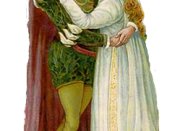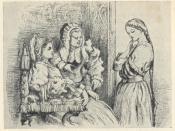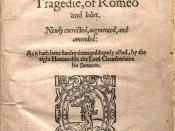The Love Sonnet and Quatrain
In Romeo and Juliet, by William Shakespeare, two offspring, Romeo and Juliet, of opposing families, the Montagues and the Capulets, fall madly in love. During the story, Romeo invites himself to a large dinner hosted by Lord Capulet, Juliet's father. Romeo first meets Juliet at this dinner and starts to talk to her passionately in a form of a sonnet. By the end of the sonnet, Romeo and Juliet end up kissing.
In the beginning of the sonnet, Romeo approaches Juliet. He refers to Juliet's hand as a "holy shrine" and grabs her hand. However, Romeo says that this is a sin. Therefore, he says that his lips, or "blushing pilgrims" (pilgrims questing for Juliet's love) as he refers to them, can smooth the rough touch of his hand on hers, with a gentle kiss.
However, Juliet says that Romeo is overreacting. The physical touch between his hand and hers is not a big deal or a sin.
Juliet refers to herself as a saint who has hands that a pilgrim, such as Romeo, would love to touch. Since Romeo is such a "holy" pilgrim, Juliet only allows Romeo to touch her hand. This is the kiss that they share.
Romeo is not satisfied with this first kiss though. He asks Juliet, "Have not saints lips, and holy palmers too?" Basically what he is asking is, "If saints have holy hands, don't they have holy lips too?" Romeo is saying that if Juliet has holy hands that he can touch, her lips must be holy too. Therefore, Romeo should be able to touch them with his lips or, kiss them. Juliet says that those holy lips saints have are used for praying, not touching.
Romeo says that hands pray and touch. He basically...


